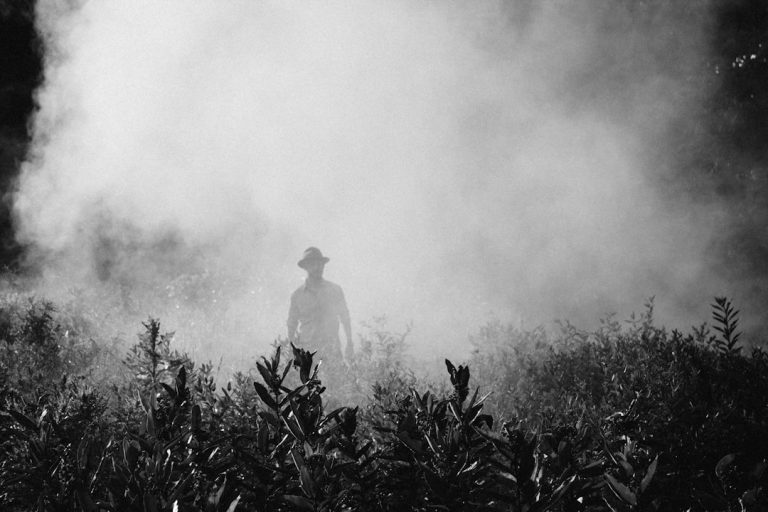
Ambrose Bierce (1842-1914) was an American writer, journalist, and Civil War veteran known for his satirical and often cynical works. Born in Ohio, Bierce’s experiences as a Union soldier during the Civil War significantly influenced his writing style and themes. His literary works frequently explored topics such as death, morality, and the absurdities of human existence, reflecting his critical view of society and human nature.
One of Bierce’s notable contributions to American literature is the short story “A Horseman in the Sky,” published in 1889. This tale examines the moral complexities faced by individuals during wartime, set against the backdrop of the American Civil War. The story centers on Carter Druse, a young soldier grappling with internal conflict as he confronts the harsh realities of war and the weight of personal duty and loyalty.
“A Horseman in the Sky” exemplifies Bierce’s characteristic style, combining elements of realism with psychological insight. The narrative explores the protagonist’s emotional turmoil as he faces a pivotal decision, ultimately leading to a conclusion that prompts readers to contemplate the nature of sacrifice and the ethical dilemmas inherent in armed conflict.
Key Takeaways
- Ambrose Bierce was an American writer known for his cynical and satirical style, and “A Horseman in the Sky” is one of his most famous short stories.
- “A Horseman in the Sky” is a story set during the Civil War and follows a young soldier who faces a moral dilemma when he discovers his father, a Confederate soldier, on the battlefield.
- The story is filled with haunting elements, including the eerie setting of a fog-covered mountain, the ghostly appearance of the horseman, and the protagonist’s internal struggle with his duty and loyalty.
- The themes and symbolism in the story revolve around the moral complexities of war, the blurred lines between right and wrong, and the haunting consequences of one’s actions.
- The impact of the Civil War on the characters is profound, as it forces them to confront their loyalties, beliefs, and the harsh realities of war, leading to difficult and haunting decisions.
Summary of A Horseman in the Sky
The Internal Struggle Begins
The story commences with Carter stationed at a lookout point high above a valley, where he is tasked with observing enemy movements. As he gazes down into the valley, he becomes acutely aware of the presence of his father, who is on the opposing side of the conflict.
A Heart-Wrenching Decision
This revelation sets the stage for an intense internal struggle as Carter grapples with his feelings of love for his father and his commitment to his country. As the story progresses, Carter’s emotional turmoil intensifies. He is faced with an agonizing decision: to fulfill his duty as a soldier by reporting on enemy movements or to spare his father from potential harm.
The Tragic Consequences of War
The tension builds as Carter watches his father ride into view, oblivious to the danger that looms above him. In a moment of profound conflict, Carter must confront the implications of his actions. Ultimately, he makes a heart-wrenching choice that underscores the tragic nature of war and its capacity to fracture familial bonds. The story concludes with a haunting image of Carter’s father falling from his horse, symbolizing not only the loss of life but also the irrevocable consequences of war on personal relationships.
Analysis of the Haunting Elements in the Story

The haunting elements in “A Horseman in the Sky” serve to amplify the emotional weight of Carter Druse’s internal conflict. Bierce masterfully employs imagery and symbolism to create an atmosphere steeped in tension and foreboding. The setting itself—a high vantage point overlooking a valley—acts as both a literal and metaphorical representation of Carter’s precarious position.
As he stands sentinel over the landscape below, he is not only observing enemy movements but also grappling with the moral implications of his role as a soldier. The vastness of the valley contrasts sharply with Carter’s isolation, emphasizing his internal struggle as he contemplates the consequences of his actions. Moreover, Bierce’s use of nature as a backdrop enhances the haunting quality of the narrative.
The serene beauty of the landscape belies the violence and chaos that war brings, creating a dissonance that resonates throughout the story. The imagery of the horseman—Carter’s father—riding into view serves as a poignant reminder of familial ties that are threatened by the ravages of war. This juxtaposition between the idyllic setting and the grim reality of conflict heightens the emotional stakes for Carter, making his eventual decision all the more tragic.
The haunting elements in Bierce’s narrative not only evoke a sense of dread but also invite readers to reflect on the broader implications of war on human relationships.
Themes and Symbolism in A Horseman in the Sky
| Themes and Symbolism in A Horseman in the Sky | |
|---|---|
| Themes | Symbolism |
| War | The Civil War as a backdrop for the story |
| Duty and Honor | The soldier’s sense of duty and honor |
| Fate and Sacrifice | The inevitability of fate and the sacrifices made in war |
| Family and Loyalty | The protagonist’s loyalty to his family and his duty |
At its core, “A Horseman in the Sky” grapples with themes of duty, sacrifice, and the moral complexities inherent in war. Carter Druse’s internal struggle embodies the conflict between personal loyalty and national allegiance, illustrating how war forces individuals to confront difficult choices that can have devastating consequences. The story raises profound questions about what it means to be loyal—to one’s family, to one’s country—and how those loyalties can become entangled in ways that lead to tragedy.
Bierce’s exploration of these themes resonates deeply within the context of the Civil War, where families were often torn apart by opposing allegiances. Symbolism plays a crucial role in conveying these themes throughout the narrative. The horseman himself serves as a powerful symbol of both familial love and inevitable loss.
As Carter watches his father ride into danger, he is confronted with the duality of his emotions—love for his father and duty to his country. The act of shooting his father becomes emblematic not only of Carter’s commitment to his role as a soldier but also of the profound sacrifice that war demands from individuals. Additionally, Bierce’s use of height as a symbol—Carter’s position on high ground—reflects both clarity and isolation; while he has a clear view of the battlefield below, he is also distanced from the emotional connections that ground him in humanity.
The Impact of the Civil War on the Characters
The Civil War serves as an omnipresent force that shapes the characters’ motivations and actions in “A Horseman in the Sky.” For Carter Druse, this conflict is not merely an abstract concept; it is a reality that forces him to confront his values and beliefs head-on. The war creates an environment where traditional notions of loyalty are tested to their limits. As Carter stands watch over his father’s movements, he embodies the tragic consequences of a divided nation—a son forced to choose between allegiance to family and duty to country.
This internal conflict reflects broader societal tensions during this tumultuous period in American history. Carter’s father also represents another facet of this impact; he is not merely an enemy combatant but a symbol of familial love caught in an unforgiving landscape shaped by war. His presence evokes feelings of nostalgia and longing within Carter, amplifying the emotional stakes at play.
The Civil War transforms familial relationships into battlegrounds where love is overshadowed by duty and ideology. Through these characters, Bierce illustrates how war permeates every aspect of life, leaving indelible marks on individuals and their relationships.
The Psychological Effects of War in A Horseman in the Sky

The psychological effects of war are intricately woven into “A Horseman in the Sky,” manifesting through Carter Druse’s internal struggle and emotional turmoil. As he grapples with his conflicting loyalties, readers witness firsthand how war can fracture an individual’s psyche. The weight of responsibility weighs heavily on Carter; he is acutely aware that his actions could lead to irreversible consequences for both himself and his father.
This burden creates an atmosphere rife with tension and anxiety, illustrating how war can warp one’s sense of self and morality. Bierce captures this psychological dissonance through vivid imagery and introspective narration. As Carter stands at his post, he oscillates between moments of clarity and overwhelming doubt.
The haunting realization that he may have to take his father’s life creates an emotional chasm that threatens to consume him. This portrayal serves as a poignant reminder that war does not merely affect those on the battlefield; it seeps into the minds and hearts of individuals caught in its wake. Through Carter’s experience, Bierce underscores how war can lead to profound psychological scars that linger long after physical battles have ceased.
The Legacy of A Horseman in the Sky and its Influence on Literature
“A Horseman in the Sky” has left an indelible mark on American literature, influencing generations of writers who grapple with similar themes of conflict, morality, and human relationships. Bierce’s ability to convey complex emotions through concise yet powerful prose has inspired countless authors to explore the psychological dimensions of their characters’ experiences during times of war. The story’s exploration of duty versus loyalty resonates across various literary genres, prompting readers to reflect on their own values and beliefs in times of crisis.
Moreover, Bierce’s unique narrative style—characterized by vivid imagery and an unflinching examination of human nature—has paved the way for modernist writers who seek to delve into existential themes within their works. “A Horseman in the Sky” stands as a testament to Bierce’s literary prowess and serves as an enduring reminder of literature’s capacity to illuminate complex moral dilemmas faced by individuals during tumultuous times. As readers continue to engage with this poignant tale, they are invited not only to reflect on its historical context but also to consider its relevance within contemporary discussions surrounding war, loyalty, and sacrifice.
If you enjoyed the thematic depth and narrative style of Ambrose Bierce’s “A Horseman in the Sky,” you might find the exploration of literary techniques in poetry interesting as well. Understanding these techniques can enhance your appreciation of how writers like Bierce effectively use language to craft their stories. You can read more about these techniques in an article that discusses various poetic devices. To delve deeper into this topic, check out the article here.
FAQs
What is the story “A Horseman in the Sky” about?
The story “A Horseman in the Sky” by Ambrose Bierce is a short story set during the American Civil War. It follows a young soldier who is faced with a moral dilemma when he discovers that his father is fighting for the opposing side.
Who is the author of “A Horseman in the Sky”?
The author of “A Horseman in the Sky” is Ambrose Bierce, an American short story writer, journalist, poet, and Civil War veteran.
When was “A Horseman in the Sky” written?
“A Horseman in the Sky” was written by Ambrose Bierce and first published in 1889.
What is the significance of the title “A Horseman in the Sky”?
The title “A Horseman in the Sky” refers to a pivotal moment in the story when a Union soldier is perched on a cliff and sees a Confederate soldier on horseback in the valley below.
What themes are explored in “A Horseman in the Sky”?
The story “A Horseman in the Sky” explores themes of duty, loyalty, family, and the moral complexities of war. It also delves into the psychological and emotional impact of war on individuals.






